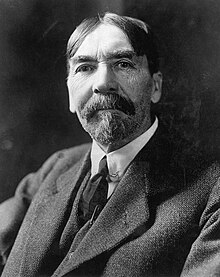Dhiyanesh Ravichandran.
Only when my family attempted to pack all our things at home to move to our new house, we realised how many goods we have purchased in the past. Now a mini-lorry can't address our needs, we have to look for a maxi-truck! This signifies a great surge in our consumption patterns in the recent years - goods of all types and range. Nevertheless, our family income has never increased! This phenomena is not confined only to my family, but to the whole world, especially the developed world. But in developing economies like India and China, the average per capita consumption is increasing at a higher rate comparing to those developed nations, although our quantum consumption is much lower in value comparingly. This pattern can be attributed to the integration of economies globally and economists claim it to be a sign of growth to pursue the dream of reaching the 'developed' status, but we (sociologists) are critical about that.
 |
| Veblen coined the term "conspicuous consumption" |
In his book The Theory of the Leisure Class (1899), Veblen criticised the leisure class (which is closely tied to business) fore its role in fostering wasteful consumption. To impress the rest of the society, the leisure class engaged in both "conspicuous leisure" (the non-productive use of time) and "conspicuous consumption" (spending more money on goods than they are worth). Those in all other social classes are influenced by this example and seek, directly and indirectly, to emulate the leisure class. The result is a society characterised by the waste of time and money.
At this point, we have to understand two overlapping concepts in this regard - Conspicuous consumption and Invidious consumption. Conspicuous consumption describes how wealthy people spend large amounts of money on luxury goods and services as a way of showing their economic power and status. Such a public display of discretionary economic power is a means either of attaining or of maintaining a given social status. Whereas, Invidious consumption means, more specifically, deliberate conspicuous consumption of goods and services intended to provoke the envy of other people, as a means of displaying the buyer’s superior socio-economic status.
Conspicuous consumption does not refers to all large expenses. But instead, it refers to spending as a way of showing off who you are. In fact, sometimes what
you end up with is no better, or sometimes worse, than what you can get
for less money. A classic example can be the use of silver utensils and fine china for meals, especially when guests are
over. Bringing out the good stuff does show that you’ve attained a
certain level of material comfort, but it’s also not very practical.
Silver has to be polished, china breaks easily, and neither can go into
the dishwasher. Their main purpose, then, is one of status display.
We all know that Apple makes a wicked-cool cell phone it calls the iPhone. You can load little
software programs on it, called “apps”, that do various functions. One of these apps is called the “I am rich” application.
It costs $1,000 and serves absolutely no purpose other than to shine a
red ruby on your iPhone that lets others know that you could afford to
buy this app. That’s it. It shows that you’re rich and doesn’t do
anything else. Apparently Apple no longer carries it at its stores
because it was getting bad publicity (again, making decisions on how
people perceive something).
We cannot limit the concept to just the well-to-do. Even college students engage in it. The use and craze for posh brands of dresses, sandals, gadgets and other fashionable items is a good example. In spite of the cheap availability of locally-made generic wears, students prefer costly Puma or Adidas, even though students don't need that 'so-called' high-level performance. One could make the case that it’s an issue of style and cultural taste,
and that makes sense. But the main reason for their appeal could be that
name brand clothes show status. They show that you have the money and
prestige to wear the coolest things. Whatever the goods and services maybe, we always try to orientate with the costly and luxurious options of the lot. May it be a consumer good or education, healthcare or any other services, our choices are conspicuous to possible extent.
In India, such a trend seems little serious. Considering the widening income gap between the rich and poor, and plethora of societal stratification, conspicuous consumption is a social pathos. It creates and widens class differentiation at different levels. It leads to consumerism. We measure our success only in terms of the accumulation of material things, which is a major factor contributing to greed and corruption. We are tempted by the extended range of goods available and by their grabbing TV advertisements. We must understand the corporates hand behind this drive. In a capitalistic economy, a company can maximise its profits only by increasing the sale of the produced goods, which ultimately depends on people's consumption. In such a background, quality and durability of the goods and services are compromised; only then people will consume again and again.
 |
| RATIONAL CONSUMER: Have command on what you consume and do not get dictated by someone |
